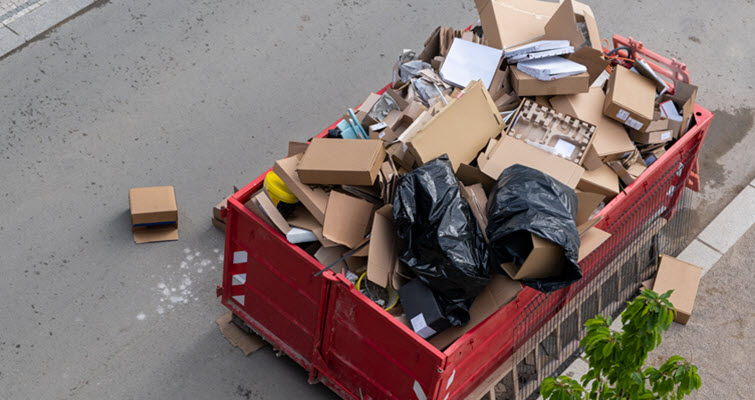A residential dumpster rental is a great option for home cleanouts, renovations, and landscaping. Yet, renters are often surprised to receive overage fees at the end of the rental period. These all add up, making your dumpster hire more expensive than expected. The good news? Fortunately, with a little planning and awareness, you don’t have to incur these additional costs. Here’s what to know to help keep your dumpster rental within budget.
Are You Overloading Your Dumpster Without Realizing It?
Every dumpster size has a weight limit, typically noted in tons (1 ton = 2,000 pounds). A 10-yard dumpster, for instance, might be limited to 1-2 tons, whereas a 40-yard dumpster might accommodate 4-6 tons. The problem is that the weights of the different materials are very different. Things like clothes, toys, and furniture are relatively lightweight. Construction debris like drywall, tile, and wood can add up quickly. Dirt, concrete, and roofing materials are super-heavy, sometimes hitting the weight limits before the dumpster gets full.
So how can you stay within weight limits?
- Measure your waste: When renting a dumpster, factor in the weight of your material. If in doubt, call BG’s Big Box Service for assistance.
- Evenly distribute the weight: Don’t pile up all of your heavy materials on one side of the dumpster, as this can cause the dumpster to tip and may create safety hazards.
- Multiple dumpsters for multiple materials: Renting two smaller dumpsters for your project might be more cost-effective if you have both lightweight and heavy materials rather than overloading a larger dumpster.
Did You Choose the Right Dumpster Size for Your Project?
Mistakes that can result in additional charges: Choosing the wrong dumpster size Many renters seek to save by renting a small dumpster, only to realize that a second one is needed — or worse, to overstuff one.
The Size of a Dumpster and What to Use It For
- 10-yard dumpster: Ideal for small cleanouts, including garage decluttering or minor remodeling projects.
- 20-Yard Dumpster: For whole-home renovations, floor removals, and smaller construction jobs.
- 30-yard dumpster: An excellent option for large-scale home renovations, deck tear downs, or total-home cleanouts.
- 40-yard dumpster: Ideal for large-scale construction sites, commercial clean-outs, or major demolition jobs.
Result of Choosing the Wrong Size
- Overfilling the dumpster: If garbage sticks above the top of the container, you could incur an overage fee or be asked to remove excess debris.
- Ordering a second dumpster: If the first dumpster isn’t enough, getting another one will cost more than ordering the right size the first time.
How to Choose the Right Dumpster Size
- Be realistic about how long the project will take. A 10-yard dumpster may not be sufficient if you’re cleaning out multiple rooms.
- Tip: If you are unsure about the appropriate dumpster for your needs, ask for expert advice.
- Budget for wiggle room: It’s always better to have some extra space than to stuff a too-small dumpster.
Are Hidden Fees Catching You Off Guard?
It’s also possible to be slapped with fees you didn’t see coming, even if you get the dumpster size right and obey weight limits. To the surprise of many renters, some important terms in their rental agreement come with additional charges. Some common hidden fees to keep an eye out for include:
A. Extended Rental Fees
Most dumpster rental companies provide a typical 7- or 14 days. If you hold onto the dumpster past this point, you will be charged extra. Tip: Be smart with your timeline and arrange for a timely pickup to avoid additional fees.
B. Prohibited Items Fees
Not everything can be thrown into a residential dumpster. Others, such as hazardous waste, tires, electronics, and appliances, may need special disposal. If these items are discovered in your dumpster, you may be charged. Tip: Before filling your dumpster, review the list of prohibited items with BG’s Big Box Service.
C. Trip Fees
If your dumpster is not accessible at collection time (by vehicles, locked behind a gate, etc.), you may incur a fee for a failed collection attempt. Tip: On pickup day, ensure that the dumpster is easily accessible.
D. Overfilling Fees
When waste protrudes over the top of the dumpster, it cannot be safely transported. Many companies will not pick it up or charge more to deal with the overflow.” Keep the waste level at or below the top edge of the dumpster.
Final Thoughts: How to Keep Your Dumpster Rental Budget-Friendly
Tons of us know better than blindly signing up for services and not being surprised with charges that could have been avoided with little planning. The key to avoiding overage fees when renting a residential dumpster is:
- Pick the right size for your project to avoid getting a second dumpster rental.
- Balance heavy and light materials to be aware of the weight limit.
- You will be charged disposal fees for prohibited items if you do not follow the disposal guidelines.
- Adhere to your rental time to avoid missed-day fees.
- Keep the area around the dumpster clear to allow for smooth pickup.
At BG’s Big Box Service, we help customers in Sun Valley, CA, and surrounding areas obtain a dumpster rental conveniently and without excessive charges. Not sure how much you’ll need for your dumpster rental? Doing some planning now could save you a great deal of money later.
Looking for a dumpster for your next project? We are here for you!



